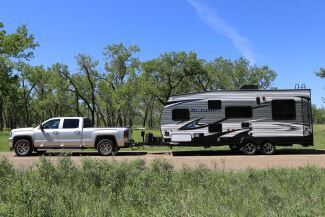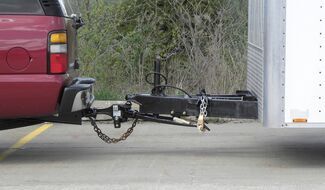
Troubleshooting Trailer Suspension to Reduce Porpoising
Question:
Hello, I am having trouble towing my RV specifically with what I call porpoising. Chucking on bad roads, especially older concrete roads with expansion joints. The kind that makes your kidneys hurt I have a 2012 Ram 1500 crew cab truck with a 5.7 hemi and my TT is a 25foot tandem axle Jayco. The GVWR of the TT is about 8100 lbs. I have measured the tongue weight at about 900 lbs. I use a Curt WD Hitch with an add on friction sway control. I have changed the truck shocks to Bilstiens, added Timbren overloads, and air bags in the rear coil springs. All combined, it has taken away about 1/2 of the porpoising but it can still be bad. What else can be done? Would Dexter EZ Flex equalizers help? Would an air ride receiver hitch help? Any suggestions would be appreciated. We are planning a longer vacation with the TT later this year and I am dreading the drive. Thank you in advance for your help.
asked by: Matthew H
Helpful Expert Reply:
It sounds like you have done everything possible on the tow vehicle side to reduce the up-and-down porpoising you noted, so I suggest checking out the trailer's suspension. Leaf springs do wear out and lose their weight-carrying capacity and this can lead to more motion from the overall system than with new springs. Also items like shackle straps can wear, their round holes becoming enlarged and/or egg-shaped. If many components in a trailer suspension are worn you can end up with excessive motion and reduced capacity to deal with road irregularities.
I suggest you pull one of the springs and its related hardware to check for obvious wear or damage. I linked our page for all trailer suspension components and also a video and article that will help you evaluate the condition of your trailer's suspension.
Another potential cause for the porpoising is the movement of water in the tanks. Water is pretty heavy and once set in motion it tends to keep moving. Also, if your total TW is near the maximum for your weight distribution system, then it may be unable to steady the trailer. Check that your actual TW is near the middle of the WD system's operating range.

Product Page this Question was Asked From
6-Leaf Double-Eye Spring for 4,500-lb Trailer Axles - 26" Long
- Trailer Leaf Springs
- Double Eye Springs
- 4500 lbs
- 1-3/4 Inch Wide
- 6 Leaf
- 26 Inch Long
- Painted
- etrailer
more information >
Featured Help Information
Miscellaneous Media

Continue Researching
- Shop: 6-Leaf Double-Eye Spring for 4,500-lb Trailer Axles - 26" Long
- Shop: MORryde Suspension Upgrade Kit for Tandem Axle Trailers - 2-1/4" Long Shackle Straps
- Shop: Curved Equalizer for 1-3/4" Wide Double-Eye Spring - 14-3/4" Long - 9/16" Center Hole
- Search Results: e27sr
- Shop: Dexter Heavy-Duty Suspension Kit for Tandem-Axle Trailers - 1-3/4" Wide Double Eye Springs
- Shop: etrailer Rust-Resistant 6-Leaf Double Eye Spring for 6K Trailer Axles - 26" Long - Dacromet
- Q&A: 26 Long Replacement Leaf Spring for 4,500 lbs Axle and Lift Kit for 5th Wheel Trailer
- Q&A: Determining Which Leaf Springs Fit 2016 Grand Design Reflection 29RS W/ 4400lb Lippert Axles
- Video: Review of etrailer Trailer Leaf Spring Suspension - 6 Leaf Double Eye Spring 4500 lbs Axle - e27SR
- Search Results: sp~256275
- Q&A: How To Determine Which Leaf Springs Fit A 2020 Tracker Targa V18 Tandem Axle Trailer
- Search Results: 26 leaf spring
- Search Results: leaf spring
- Q&A: Does the Axle Need to Be Supported When Replacing U-Bolts on a Trailer Axle
- Search Results: e88sr
- Search Results: 26 inch leaf spring
- Search Results: mr46zr
- Shop: Dexter Tandem-Axle Trailer Hanger Kit for 2" Slipper Springs - 38" Axle Spacing
- Shop: CE Smith U-Bolt Kit for Mounting 5.2K to 7K, Round Trailer Axles - 7" Long U-Bolts - Zinc
- Q&A: Replacement 6-Leaf Spring Recommendation for Trailer with 26-1/4 inch Old Springs
- Q&A: Replacement U-Bolt Kit For Dexter 4400lb 3 Axle With 6-Leaf Springs
- Q&A: Replacement Leaf Spring Recommendation for 2016 Chalet XL to Stiffen Up Suspension
- Shop: Trailer Hitch
- Shop: Suspension Enhancement
- Article: Best Hitches for Travel Trailers (2022) - For a Smooth, Sway-Free Ride
- Article: 5 Tips to Confidently Choose Your Weight Distribution Hitch
- Video: Review of Dexter Trailer Leaf Spring Suspension - Equalizer Upgrade Kit - K71-652-00
- Shop: Brake Controller
- Video: B&W Continuum Weight Distribution System Review
- Article: 5 Things to Know About Weight Distribution Hitches






























